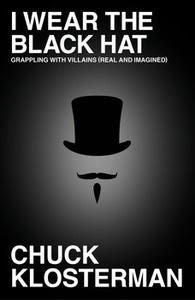Take a photo of a barcode or cover
I wandered into an airport bookstore on a layover. I was intrigued by the cover, interested in the theme, and finally sold on the chapter titles (such as "Villains Who Are Not Villains"). It didn't hurt that it looked like the book would contain a good deal of humor while still being intelligent nonfiction.
I definitely enjoyed this book. I'll have to go check out other books by the author.
I was surprised that so much of the book was about nonfiction persons rather than fictional villains, but that's okay, it kept my attention. The author covers a lot of material, meaning every few pages you're reading about a different person.
I don't disagree with what other reviewers said about the author's tendency to dip into self-analysis. But meh, he's earned the right to occasionally share his personal thoughts. And overall, I appreciated having a series of essays based on a theme (the theme of what makes a villain a villain).
I definitely enjoyed this book. I'll have to go check out other books by the author.
I was surprised that so much of the book was about nonfiction persons rather than fictional villains, but that's okay, it kept my attention. The author covers a lot of material, meaning every few pages you're reading about a different person.
I don't disagree with what other reviewers said about the author's tendency to dip into self-analysis. But meh, he's earned the right to occasionally share his personal thoughts. And overall, I appreciated having a series of essays based on a theme (the theme of what makes a villain a villain).
Despite the fact that I disagree with his views more and more as he gets older, I still enjoy Klosterman for how he explores context. He's a bit easier to stomach here too than in eating the dinosaur as the tone is less authoritarian, though I still enjoy his earlier work much much more.
Both the book and the author are incredibly annoying and I dislike them both.
I purchased this book because I had heard so many good things about Chuck Klosterman. This is the first book of his that I've purchased; however, I have read his Grantland pieces and some other work on pop culture and sports. And this book has a great premise- who are the villains, why are they villains, and how did they become villains. Klosterman answers these three questions, mostly, but the majority of the essays in this collection lack depth. CK scratches the surface on one of his subjects, digresses into discussing other people without a clear transition, and then comes back to the original subject, without clearly tying everything together.
Therefore, this book mostly forgettable. The OJ Simpson and the NWA essays are the most lucid and well-executed pieces.
You'd be better off checking this out at a library than buying it.
Therefore, this book mostly forgettable. The OJ Simpson and the NWA essays are the most lucid and well-executed pieces.
You'd be better off checking this out at a library than buying it.
I tried to buy this in a hip Chicago bookstore, and the clerk there was telling me that they were sold out. She then proceeded to explain to me that she didn't like Chuck Klosterman and why.
I couldn't help but think what a weird move this was, explaining to me why she didn't like an author rather than asking me something like "Do you want to order one? From our BOOKSTORE. Where we survive by bringing books from outside, putting them in here, and then forcing people to give us money to take the books back outside."
But anyway, her complaint was that Chuck Klosterman's book Killing Yourself to Live was not enough about the deaths of rock stars and too much about Chuck Klosterman. She used a phrase that I don't care for, "navel-gazing."
Navel-gazing, to me, describes a work that is ABOUT the author, but not really about the author DOING anything. Just thinking about stuff. More importantly, uninteresting stuff. What would happen if most of us wrote a memoir at 23.
I don't really see the point of a cultural writer like Klosterman if he isn't writing about himself. At least somewhat. Coming at it from HIS perspective.
It's 2013. If I googled, how many opinions or cute things could I read about any pop culture topic? Holy shit, you could read about the TV series M.A.N.T.I.S. that me and 3 other people, including the stars, would remember, you could search that and read about it all goddamn day without seeing a repeated article.
If you're not including a piece of yourself in pop culture, you're wasting your time!
If you wrote a review of this book that summarizes what happened and provides no personal perspective, I'm not really sure what I'm supposed to take away from it.
Which is the big difference. A writer acknowledges that he or she is writing because someone is going to be reading it.
So in this book, Klosterman is talking about villains. Basically, what makes a person a villain as opposed to a non-villain. How will history remember someone and why.
Some of the questions are truly fascinating:
-Why do we all worship Muhammad Ali even though he viciously used race to turn the public opinion on Joe Frazier, the sort of thing we would never tolerate today?
-How is OJ Simpson's book outlining how he would have murdered his own wife not considered a more interesting cultural object?
-How did Monica Lewinsky become the villain in the Clinton scandal?
-Why is Taylor Swift popular?
God help me, I never thought I would say this, but one of the book's most interesting essays was about Machiavelli.
Klosterman pushes a theory that the villain is the person in any situation who knows the most and cares the least. A situation, dear reader, that I am well aware of.
At a workplace a group of us were talking about the inadequacy of maternity leave. How short it was, how it was difficult to manage, and so on, and we were discussing how it seems as though the main goal is to prevent employees from giving birth.
I said, "Well, you know what they should do? They should just put 'hysterectomy patients preferred' right on the application. At least that way they'd be honest."
A co-worker looked at me and in all seriousness said, "I don't understand how anyone has ever dated you."
Which was kind of hurtful, and honestly upsetting because I felt like I was just quantifying what the policy said, granted in an outlandish and ridiculous way, but I wasn't actually SAYING that people who had functioning uteruses (uteri?) should seek employment elsewhere.
What happened was that I knew the most and was therefore able to sum it up, but also came off as caring the least because I joked about the topic. I found myself the villain even though I agreed that the maternity leave was inadequate and also said something about it that was directed to highlight the ridiculousness.
The Machiavelli essay is about the idea that Machiavelli may not have been in any way Machiavellian, and that history has started to uncover the idea that The Prince was satire, not a how-to book on being a dick to get ahead. Yet, Machiavelli will be remembered for being the guy who knew how to be a dick and get ahead. Even if he doesn't use that knowledge, just his ability to put himself in that frame of mind and think along those lines makes people question his goodness.
It's an idea that's false, but also happens almost 100% of the time in practice.
If I pose a bizarre idea, like the idea that I invented the perfect artificial heart, and in Iron-Man-like fashion a light shines through the recepient's chest, and everything is perfect except that this light is in the shape of a swastika, when I pose that idea people never say, "That WOULD be weird" or "That would be a strange world" or "I wonder what a Holocaust survivor would do when faced with a tough decision". Instead, they say, "Why do you think about this stuff?" They turn it back on whoever came up with it, ignoring the fact that I clearly recognize myself how insane that entire situation is.
Frankly, I shudder to think what other people are doing in their heads all day if not thinking of strange scenarios. What are you guys thinking about in there? What you packed for lunch? What you're wearing and how you feel about it? High school?
So, I guess by Chuck Klosterman's definition, I'm semi-evil.
But you know what? I'm in good company with Machiavelli. We're very alike in our own little way. Granted, he wrote an all-time philosophical classic while I just made nyuck-nyucks about a grave surgical procedure. But it's definitely as close as I'm going to get.
I couldn't help but think what a weird move this was, explaining to me why she didn't like an author rather than asking me something like "Do you want to order one? From our BOOKSTORE. Where we survive by bringing books from outside, putting them in here, and then forcing people to give us money to take the books back outside."
But anyway, her complaint was that Chuck Klosterman's book Killing Yourself to Live was not enough about the deaths of rock stars and too much about Chuck Klosterman. She used a phrase that I don't care for, "navel-gazing."
Navel-gazing, to me, describes a work that is ABOUT the author, but not really about the author DOING anything. Just thinking about stuff. More importantly, uninteresting stuff. What would happen if most of us wrote a memoir at 23.
I don't really see the point of a cultural writer like Klosterman if he isn't writing about himself. At least somewhat. Coming at it from HIS perspective.
It's 2013. If I googled, how many opinions or cute things could I read about any pop culture topic? Holy shit, you could read about the TV series M.A.N.T.I.S. that me and 3 other people, including the stars, would remember, you could search that and read about it all goddamn day without seeing a repeated article.
If you're not including a piece of yourself in pop culture, you're wasting your time!
If you wrote a review of this book that summarizes what happened and provides no personal perspective, I'm not really sure what I'm supposed to take away from it.
Which is the big difference. A writer acknowledges that he or she is writing because someone is going to be reading it.
So in this book, Klosterman is talking about villains. Basically, what makes a person a villain as opposed to a non-villain. How will history remember someone and why.
Some of the questions are truly fascinating:
-Why do we all worship Muhammad Ali even though he viciously used race to turn the public opinion on Joe Frazier, the sort of thing we would never tolerate today?
-How is OJ Simpson's book outlining how he would have murdered his own wife not considered a more interesting cultural object?
-How did Monica Lewinsky become the villain in the Clinton scandal?
-Why is Taylor Swift popular?
God help me, I never thought I would say this, but one of the book's most interesting essays was about Machiavelli.
Klosterman pushes a theory that the villain is the person in any situation who knows the most and cares the least. A situation, dear reader, that I am well aware of.
At a workplace a group of us were talking about the inadequacy of maternity leave. How short it was, how it was difficult to manage, and so on, and we were discussing how it seems as though the main goal is to prevent employees from giving birth.
I said, "Well, you know what they should do? They should just put 'hysterectomy patients preferred' right on the application. At least that way they'd be honest."
A co-worker looked at me and in all seriousness said, "I don't understand how anyone has ever dated you."
Which was kind of hurtful, and honestly upsetting because I felt like I was just quantifying what the policy said, granted in an outlandish and ridiculous way, but I wasn't actually SAYING that people who had functioning uteruses (uteri?) should seek employment elsewhere.
What happened was that I knew the most and was therefore able to sum it up, but also came off as caring the least because I joked about the topic. I found myself the villain even though I agreed that the maternity leave was inadequate and also said something about it that was directed to highlight the ridiculousness.
The Machiavelli essay is about the idea that Machiavelli may not have been in any way Machiavellian, and that history has started to uncover the idea that The Prince was satire, not a how-to book on being a dick to get ahead. Yet, Machiavelli will be remembered for being the guy who knew how to be a dick and get ahead. Even if he doesn't use that knowledge, just his ability to put himself in that frame of mind and think along those lines makes people question his goodness.
It's an idea that's false, but also happens almost 100% of the time in practice.
If I pose a bizarre idea, like the idea that I invented the perfect artificial heart, and in Iron-Man-like fashion a light shines through the recepient's chest, and everything is perfect except that this light is in the shape of a swastika, when I pose that idea people never say, "That WOULD be weird" or "That would be a strange world" or "I wonder what a Holocaust survivor would do when faced with a tough decision". Instead, they say, "Why do you think about this stuff?" They turn it back on whoever came up with it, ignoring the fact that I clearly recognize myself how insane that entire situation is.
Frankly, I shudder to think what other people are doing in their heads all day if not thinking of strange scenarios. What are you guys thinking about in there? What you packed for lunch? What you're wearing and how you feel about it? High school?
So, I guess by Chuck Klosterman's definition, I'm semi-evil.
But you know what? I'm in good company with Machiavelli. We're very alike in our own little way. Granted, he wrote an all-time philosophical classic while I just made nyuck-nyucks about a grave surgical procedure. But it's definitely as close as I'm going to get.
“A villain is someone who knows the most but cares the least.”
Give that a good long think.
Gotta admit it: I have a soft spot in my heart for the villains. Guess for those of you who know me, that isn’t admitting much.
This book was a compelling look at the bad guys in pop culture like Chevy Chase, Bill Clinton, Andrew Dice Clay and the Eagles. So the villains Klosterman is analyzing are, for the most part, real people rather than our favorite villains from fiction.
What I would have liked was more. It all seemed to pass too quickly.
I listened to this book, read by the author.
Give that a good long think.
Gotta admit it: I have a soft spot in my heart for the villains. Guess for those of you who know me, that isn’t admitting much.
This book was a compelling look at the bad guys in pop culture like Chevy Chase, Bill Clinton, Andrew Dice Clay and the Eagles. So the villains Klosterman is analyzing are, for the most part, real people rather than our favorite villains from fiction.
What I would have liked was more. It all seemed to pass too quickly.
I listened to this book, read by the author.
always wonderful. always though-provoking and a little bit pretentious. all the things I love
A fun but rather disjointed book. It contains anecdotes about villainy and the "villainous" and is really concerned with the perception of villainy (Hitler and OJ are obvious exceptions as they are outright villains)instead of an over-arching theme. There's no big conclusion, no big revelation. There is very little in the book that wasn't subjective. This makes sense, obviously...but not really. This book is, at its heart, sociological albeit about celebrity, was hoping for more.
My first Klosterman read, but not my last. Strong start and finish, but meanders in the middle.




